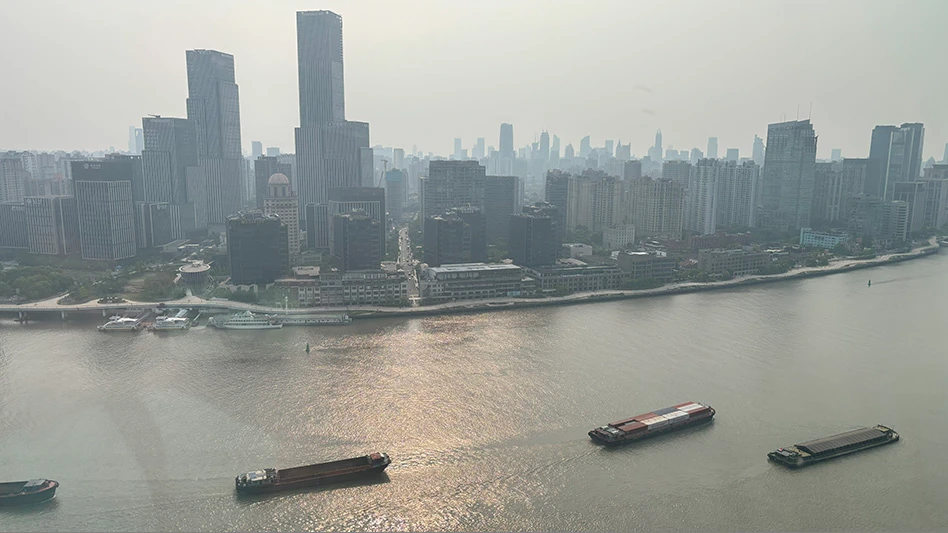ALLIED CAPTURES SHOOTING STAR
Star Services Group Inc., Pompano Beach,. Fla., has entered into an agreement to be acquired by a subsidiary of Allied Waste Industries, Houston. The transaction is valued at around $34 million, while Allied will also assume Star Services’ long-term debt.
The Florida recycler of mixed C&D debris and other commodities was profiled earlier this year in C&D Recycler, and singled out for its high-volume growth in the Sunshine State.
“We believe that this transaction is in the best interest of all of our shareholders,” says Jack Casagrande, chairman and CEO of Star Services. “It represents a premium to our recent historical trading price and we believe it is fair.”
He added that one of the reasons for the decision to sell to Allied is that Star Services ran up against problems raising funds to grow its business.
Star Services Group Inc. is an integrated solid waste services company that provides solid waste collection, transfer, disposal and recycling services in the greater Miami, Fort Lauderdale and Palm Beach areas of Florida. Star Services currently owns or operates 10 construction and demolition debris-processing facilities, two lake-fill operations and two waste collection and portable sanitation operations. Star Services has more than 3,400 customers.
Casagrande feels that the move by Allied to acquire the businesses under Star Services is a good opportunity for the large waste management firm to raise its profile in the Florida market. The company has a limited presence in the southern Florida market. Casagrande will stay with the company in the role of a consultant.
RIRRC ABANDONS PLAN
Officials from the Rhode Island Resource Recovery Corporation (RIRRC) have decided to abandon plans to purchase the 98-acre property in Coventry, R.I., formerly occupied by Global Waste Recycling, Inc.
“We may still purchase the property in the future,” says Sherry Mulhearn, RIRRC’s executive director. “But as of today, we are abandoning our plans to purchase the land and extract its valuable gravel resources for use as cover material at the Central Landfill. I will repeat once again that the Rhode Island Resource Recovery Corporation never intended to store solid waste on the Global property. Our sole interest was the rich deposits of gravel and granite.”
Because Resource Recovery would have had no use for the land after the gravel and granite had been extracted, the corporation was willing to sell the land to the Town of Coventry at a reduced rate to ensure that the land would be used for recreation. But the town may face an uncertain future if the property contains contaminated material left by the out-of-business Global Waste Recycling facility.
The decision to withdraw the plan follows a vote whereby all five members of the Coventry Town Council announced that they would not sign an agreement with the Rhode Island Resource Recovery Corp. because of the state agency’s intended use of the Global Waste property.
The decision reverses the council’s earlier approval of the measure. However, after initially approving the move, strong opposition from town residents pressured the council to change its vote.
WISCONSIN PROJECT SETS C&D RECYCLING GOAL
Alliant Energy Corp. has received a grant from the Wisconsin Department of Natural Resources for a project that focuses on maximizing construction and demolition debris recycling for materials generated from the construction of a new headquarters building.
Alliant, which is a holding company that provides energy products and services, began construction of a new headquarters in Madison, Wisc. The energy firm is working with Opus North Corp., Green Valley Disposal and WasteCap Wisconsin on the ambitious project. Opus is the lead contractor, Green Valley is the on-site hauler, and WasteCap is a non-profit organization brought in to develop, monitor and measure results of a reuse and recycling program for the building site.
As part of the project, all costs and quantities of C&D debris generated, reused and recycled are being tracked so others can learn from the project. The building is scheduled to be complete next spring.
Jim Shebesta, project manager for the construction project, notes that the “recycling program is a success so far – 50% by weight of the debris from the site has been recycled. Alliant Energy’s building project will demonstrate techniques to achieve diversion, begin to build capacity for construction material recycling in the area and produce educational materials to expand construction-material recycling statewide.”
The subcontractors are separating wood, cardboard, office paper, metal, cans, bottles, and clean fill for recycling.
The subcontractors are going beyond recycling by reducing and reusing waste. All suppliers are contacted to review their corporate policy on recycling and reuse of their products at the end of their useful life. All suppliers are being asked to use materials and processes that can maximize reuse.
The recycling program is a time-based management approach, meaning that the recycling containers are on the building site only when the majority of that material is being generated. “Just in time delivery of special boxes for waste can result in waste construction materials being source separated and the individual materials being low in contaminants,” says J. Walter Spear, solid waste consultant.
Current financial figures indicate that the recyclables will be recycled at less than the cost of trash disposal. Actual costs will be measured at the completion of the program.
Jenna Kunde, WasteCap’s executive director, expresses caution about the success of the program: “So far, everything is going great. However, it’s early in the building process, and success will depend on the builders and subcontractors continuing to be as committed as they’ve been.”
GEORGIA CITY, RECYCLER LOOK FOR RESOLUTION
The city of Savannah, Ga., and Atlas Waste and Recycling Systems have been going back and forth over the operation of the C&D processing facility. After tens of thousands of dollars in fines and complaints over the operations of the recycling operation, it appears the two sides are finding some common ground to remedy the problems.
Atlas Waste opened its facility three years ago as a recycling center for construction and demolition waste. Sixty percent of the materials brought in to the facility was to be crushed, recycled and shipped out for re-use within 90 days. Everything that couldn’t be processed was to be taken to a landfill within two days of its arrival. But almost from the beginning, officials say, the waste began growing to several times its 14-feet permitted height.
According to Mike Ruth, a consultant hired by Atlas, the original plan was for the material to be sourced, with the material that couldn’t be extracted shipped to a landfill that Atlas expected to have permitted at the same time as the recycling facility.
However, the permitting for the landfill has been slowed, resulting in Atlas being forced to use alternate sources to dispose of the non-recyclable material. The high cost of shipping to alternate disposal sites has magnified the problem for Atlas.
Another problem for Atlas was one of the key end markets for some of the C&D debris closed. The facility was expected to take in a significant amount of the fibrous C&D waste and use it for boiler fuel. However, the closure of the end market left Atlas with one less avenue for its material.
In February 2000, the state of Georgia entered into a consent agreement with Atlas to bring the company into compliance. When progress had not been made by September, fines were issued by the state Environmental Protection Division, of which $33,000 had been paid by January.
Atlas now must pay $30,000 in fines to the city, and has a superior court order forcing compliance of the consent agreement with the EPD.
MILITARY PROJECTD MARCHES FORWARD
The deconstruction and demolition of the massive Fort Ord complex in California is moving forward, though some potential barriers to deconstruction have arisen.
The Fort Ord Reuse Authority (FORA) is managing redevelopment of the decommissioned military property, on which some 2,000 buildings sit on a 45-square-mile site in northern California.
FORA is attempting to develop the site in a sustainable mode stressing reuse of buildings or materials, with recycling considered the next best option. FORA recycling manager Stan Cook says five years of inventory and research have let the agency reach several conclusions:
• Only about 5% of the buildings are likely to be re-used in place.
• Another 5% may be preserved and moved.
• Five buildings have been deconstructed, but the presence of wood covered in lead-based paint could limit the amount of future deconstruction.
• The 800 to 900 concrete buildings at the site are likely to be razed, crushed and recycled, with a 90% recycling rate possible.
According to Bill Turley of the Construction Materials Recycling Association (CMRA), Lisle, Ill., deconstruction advocates are disappointed that more wood (much of it Douglas fir) could not be recovered for reuse.
But Cook’s research showed that much of the wood has a significant amount of lead on the surface, with up to one-third of the thickness of some boards needing to be removed to make the boards reusable. Most contractors contacted have said the thick planing of such boards would not be economically feasible, although one contractor remains optimistic that 90% of the wood can be recovered in this fashion..
FORA is now seeking further grant money and capital to continue sustainability projects as it prepares to sell the Fort Ord land, which it is estimated will fetch from $70 million to $100 million.

Explore the July 2001 Issue
Check out more from this issue and find your next story to read.
Latest from Recycling Today
- Altilium produces EV battery cells using recycled materials
- Brightmark enters subsidiaries of Indiana recycling facility into Chapter 11
- Freepoint Eco-Systems receives $50M loan for plastics recycling facility
- PET thermoform recycling the focus of new NAPCOR white paper
- Steel Dynamics cites favorable conditions in Q1
- Hydro starts up construction in Spain
- Green Cubes unveils forklift battery line
- Rebar association points to trade turmoil





